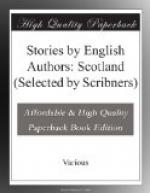“A’ wesna prepared for this, for a’ aye thocht she wud live the langest. . . . She’s younger than me by ten year, and never was ill. . . . We’ve been mairit twal’ year last Martinmas, but it’s juist like a year the day. . . . A’ wes never worthy o’ her, the bonniest, snoddest (neatest), kindliest lass in the Glen. . . . A’ never cud mak’ oot hoo she ever lookit at me, ’at hesna hed ae word tae say about her till it’s ower-late. . . . She didna cuist up to me that a’ wesna worthy o’ her—no her; but aye she said, ’Yir ma ain gudeman, and nane cud be kinder tae me.’ . . . An’ a’ wes minded tae be kind, but a’ see noo mony little trokes a’ micht hae dune for her, and noo the time is by. . . . Naebody kens hoo patient she wes wi’ me, and aye made the best o’ me, an’ never pit me tae shame afore the fouk. . . . An’ we never hed ae cross word, no ane in twal’ year. . . . We were mair nor man and wife—we were sweethearts a’ the time. . . . Oh, ma bonnie lass, what ‘ill the bairnies an’ me dae without ye, Annie?”
The winter night was falling fast, the snow lay deep upon the ground, and the merciless north wind moaned through the close as Tammas wrestled with his sorrow dry-eyed, for tears were denied Drumtochty men. Neither the doctor nor Jess moved hand or foot, but their hearts were with their fellow-creature, and at length the doctor made a sign to Marget Howe, who had come out in search of Tammas, and now stood by his side.
“Dinna mourn tae the brakin’ o’ yir hert, Tammas,” she said, “as if Annie an’ you hed never luved. Neither death nor time can pairt them that luve; there’s naethin’ in a’ the warld sae strong as luve. If Annie gaes frae the sicht o’ yir een she ’ill come the nearer tae yir hert. She wants tae see ye, and tae hear ye say that ye ’ill never forget her nicht nor day till ye meet in the land where there’s nae pairtin’. Oh, a’ ken what a’ ‘m sayin’, for it’s five year noo sin’ George gied awa’, an’ he’s mair wi me noo than when he was in Edinboro’ and I wes in Drumtochty.”
“Thank ye kindly, Marget; thae are gude words an’ true, an’ ye hev the richt tae say them; but a’ canna dae without seein’ Annie comin’ tae meet me in the gloamin’, an’ gaein’ in an’ oot the hoose, an’ hearin’ her ca’ me by ma name; an’ a’ ‘ll no can tell her that a’ luve her when there’s nae Annie in the hoose.
“Can naethin’ be dune, doctor? Ye savit Flora Cammil, and young Burnbrae, an’ yon shepherd’s wife Dunleith wy; an’ we were a’ sae prood o’ ye, an’ pleased tae think that ye hed keepit deith frae anither hame. Can ye no think o’ somethin’ tae help Annie, and gie her back her man and bairnies?” and Tammas searched the doctor’s face in the cold, weird light.
“There’s nae pooer in heaven or airth like luve,” Marget said to me afterward; “it mak’s the weak strong and the dumb tae speak. Oor herts were as water afore Tammas’s words, an’ a’ saw the doctor shake in his saddle. A’ never kent till that meenut hoo he hed a share in a’body’s grief, an’ carried the heaviest wecht o’ a’ the Glen. A’ peetied him wi’ Tammas lookin’ at him sae wistfully, as if he hed the keys o’ life an’ deith in his hands. But he wes honest, and wudna hold oot a false houp tae deceive a sore hert or win escape for himsel’.”




